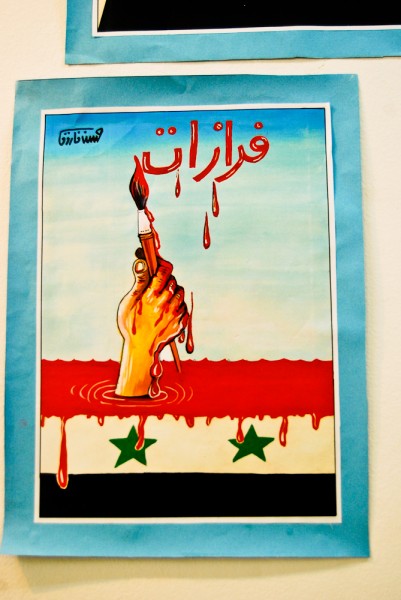Published in World Policy Journal Blog: “Egyptians Show Solidarity With Tortured Syrian Cartoonist”
Click here for more of my Ali Ferzat exhibit photos.
The first cartoon displayed in the Cairo Atelier gallery was the last one Syrian cartoonist Ali Ferzat published on his website before being attacked in Damascus in August: a panicked President Bashar Assad hitching a ride in a getaway car with Libya’s Muammar Gaddafi.
Days later, masked gunmen kidnapped Ferzat before dawn as he returned home from his studio. They dragged the 60-year-old from his car, beat him, singed his beard, put a bag over his head, and dumped his unconscious, bruised and bleeding body—with fingers of both hands broken—on the roadside near Damascus Airport with the message: “This is just a warning.” A warning, and a punishment, for daring to draw against the Syrian regime.
The regime’s brutal beating of the dissident political satirist prompted cartoonists around the world to respond with drawings illustrating the pen’s prevailing power over the sword. In Egypt, cartoonists have taken their solidarity one step further by compiling their drawings in a traveling exhibit.
Caricatures of the president and all of Ferzat’s drawings are banned from Syrian publications. Though Ferzat has been cartooning for over 40 years, with his recent drawings growing bolder—the depiction of a cowardly Assad was the first to draw the president’s ire.
When Egyptian artist Mohamed Abla, founder of the Fayoum Caricature Museum, heard the news of the attack on Ferzat, he called upon Egyptian cartoonists to participate in a tribute.
“Even though Ali is in Syria and we are in Egypt, what happens here influences the rest of the world,” Abla says. “We want to call attention to the attack on him because it was also an attack on the universal right to freedom of expression—among other injustices by the Assad regime.”
The Ferzat exhibit, just blocks from Tahrir Square, shows both the talent and the audacity of a cartoonist who has become one of the most respected and beloved cultural figures of not only his native Syria, but also the entire Middle East. His subtle yet piercing caricatures satirize universally hated injustices, resonating with and providing comic relief to people throughout the region.
“Ferzat exposes and skewers the bureaucracy, hypocrisy, brutality, and oppression of Arab dictatorships in even the simplest sketches,” says medical student Omar Fehail, a Syrian in exile in Egypt. “They’re more than just cartoons, and he’s more than just a cartoonist. He’s an inspiration whose work is thought-provoking and gets people talking.”
Egyptians’ support for Ferzat goes beyond just a show of appreciation for his work or indignation at Assad, says Sarah Mousa, an Egyptian-American Fulbright scholar in Egypt. “It’s a responsibility for Egyptian people to show solidarity with the Syrian struggle since it was largely inspired by Egypt’s,” says Mousa, who interned in Damascus in the summer of 2009 and returned to visit in March, around the time the uprising began. That solidarity has been seen all year in the Egyptian Twittersphere, at weekly protests at Cairo’s Syrian embassy, and by the many Syrian flags in Tahrir Square.
While the Arab Spring fostered a newfound Arab unity, the foundation connecting Egypt to Syria was laid long ago, explains Mosa’ab Elshamy, an Egyptian of Syrian descent. Certainly, the Arab Spring has strengthened Egyptians’ ties with fellow Arabs struggling for democracy, but their bond with Syrians runs deep into history. Syria’s flag itself remains an example of its connection to Egypt. It’s the same flag both countries used during their 1958-1961 union as the United Arab Republic; the two green stars represent Syria and Egypt. “Even though the union didn’t last, Syria has always had a special place in Egyptians’ hearts,” Elshamy says.
Some Egyptians are hoping Syrians and other Arabs will return the favor. “We never know what might happen in the difficult situation Egypt is in right now, especially under emergency law,” Abla says. “So support for Syrians is ensuring support for ourselves.”
Ferzat recently returned to home to complete recovery after nearly a month of hospitalization for treatment of his injuries. Abla plans to travel to Damascus soon to present Ferzat with the cartoons by Egyptians and a mural of well wishes signed by the cartoonists and visitors of the exhibit.
“I emailed him photos,” Abla says, “and he said his heart felt warmed by our support for him and Syria.”
The exhibit is now on display at Cairo University until Oct. 10.

